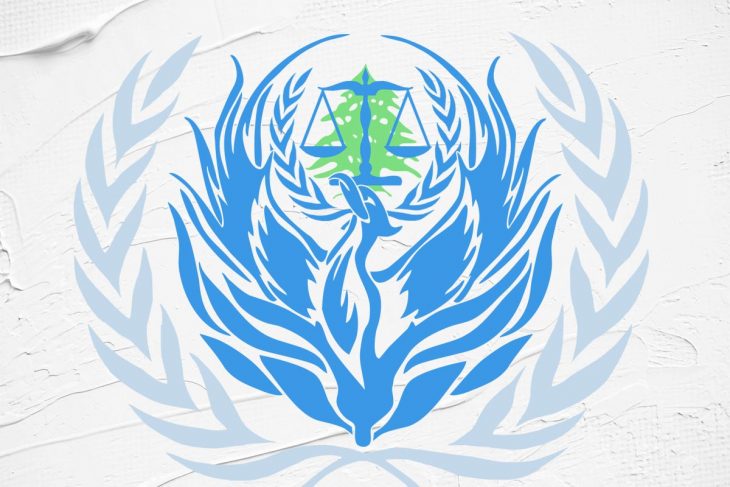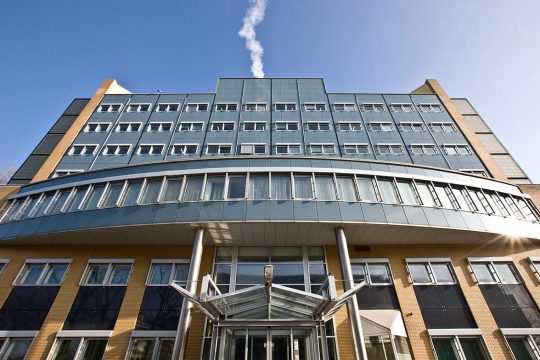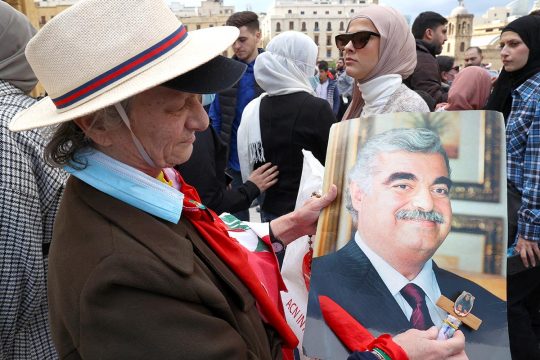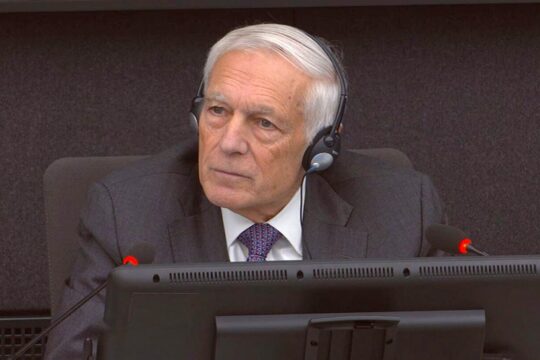It’s been an eventful twelve months for the Special Tribunal for Lebanon (STL). In August 2020 the Hague-based judges of this hybrid tribunal pronounced their verdict in the only case this court has brought to trial. They said one person, Hezbollah operative Mohamed Ayyash was guilty of the car bomb that killed former Lebanese Prime Minister Rafik Hariri in 2005, while the other three accused were acquitted. In December Ayyash was sentenced to life imprisonment for each of the five counts of which he had been found guilty.
The judgment was weighty - two thousand six hundred forty-one pages - full of historical and forensic detail, analysing around 300 witnesses and 170,000 pages of evidence gathered over a period of fifteen years since the first international investigation into Hariri’s murder was sent to Lebanon. The judgment helped to set an historical record of how the Lebanese state was deliberately destabilised. Yet it could be overturned at any point.
Ayyash, like all the accused in the case, has never appeared in court, and if an in-person trial was organised rather than the twelve years of in absentia hearings already held, the ruling would not stand.
And then it crashed
Last March the United Nations authorised another two years on the tribunal’s clock. The court’s own documents said it was costing “around 2.8 million euros per month” at this point. The STL’s annual report was preceded by the president Ivana Hrdličková proudly describing the organisation a “smart, lean and adaptable institution” - after some restructuring.
Then in June came the crash. Just as the court was gearing up to start a second trial, against the same Ayyash and again in absentia, it suddenly announced that it was “facing an unprecedented financial crisis” and would have to shut by the end of July this year. It didn’t even have the resources to complete the appeal phase of its first trial, let alone start a new one. It would be forced to lay off staff and work on “draw down activities” alone. In Beirut the predicted demise of the court caused barely a ripple. Between national economic collapse and efforts to get an international investigation into who should be held accountable for Lebanon’s biggest blast – the Beirut harbour explosion in August 2020 – the financial travails of an institution detailing distant history seemed remote. As the victims representative in the STL first case, Peter Haynes, points out, despite “some good moments” in the judgment, when judges specifically referred to reparations, “ultimately nobody paid, and nobody was compensated”. It took so long that “some victims actually died during the process”, he says.
Before December last year, some 450 people were working at the court. Outreach was cut that month. Several waves of staff have been let go. More left in July including legal aid staff. Currently there are 132 employees and there will be “another significant reduction” before the end of the year, says Wajed Ramadan, the court’s spokesperson.
No buy-in for additional trials
The substantial shortfall, and the unwillingness of donors to supply the STL with anything more than the basic necessities “to avoid a rapid and disorderly shutdown of the Tribunal's operations,” according to the registrar’s filings, acted as a brake on any further aspirations the court may have had to conduct more trials. The registrar informed the judges that donors wanted “a detailed drawdown plan, detailing staffing and other costs, as well as a clear timeline for completion”. In fact, some funds have been conditionally pledged “on the explicit condition that it be used for draw down activities only”. That would include witness protection and storing sensitive materials. Staff who have now left, seem phlegmatic: “It was bound to happen one day,” said one who wanted to remain anonymous.
But now the latest twist is that some funds have been secured, and a five-day appeals hearing in the first case will be held on October 4-8. The prosecutor is appealing against the not guilty verdict for three of the accused. It will be the first time this chamber will be ruling on substantive issues, rather than procedural matters. The STL Registrar David Tolbert told Justice Info that although they had “lost a lot of staff” and that the tribunal remains in a “very difficult situation”, it’s now in a “better situation” than back in June.
“Obviously having the appeal was very important, to close the case,” says Tolbert. Donors were convinced of the necessity to provide funds for this. But there was “no buy-in for further proceedings,” says Tolbert. The planned second case, which dealt with three other car bombings, known as the ‘connected cases’ under the court’s statute, targeting other prominent Lebanese leaders, should be considered in permanent limbo. Once the appeals’ process in the Hariri trial is completed, the tribunal will become, according to a letter to staff, “a dormant entity”.
“Enough to get us through”
So does the court now have enough to finish what it started, and to close in a more dignified manner? “I can say it’s enough to get us through,” says Tolbert. In their August letter to staff members explaining how the court will be continuing, STL principals said they had secured seven million euros. Wajed Ramadan clarifies the figures: “As per the 2021 revised budget, approved by the Management Committee on 19 July 2021, the Tribunal requires €5.7 million for the period from 1 August – 31 December 2021. The 2022 Budget, approved by the [Management Committee] on 23 August 2021, is for €7 million. It includes the core activities such as the Appeals … as well as transitioning to a dormant entity.”
It’s not known which countries have contributed: “Mostly traditional donors” says Tolbert, meaning the STL Management Committee – which includes representatives of Lebanon, the Netherlands, the United Kingdom (Chair), Canada (Vice-Chair), France, Germany, Italy, Japan, the United States and the European Union – “sufficient” numbers of them, he says, but “not everyone”. The UK is known to have taken a hard line on putting more funding in. But the Management Committee stuck jointly to the requirement that the court only be given a very narrow window of funds leading explicitly to a wrap-up of all activities as expeditiously as possible.
Donors have become unwilling to allow more. “It all just took too long and the international community lost patience," says Haynes. Former staff talk of how “there needed to be tough decisions made on staffing way earlier”. “Management has stalled making tough decisions,” says one insider who preferred not to be named.
Bringing it to dormancy
How to close the tribunal is now Tolbert’s focus. Officially called “drawdown activities”, the plans include “measures related to the protection of witnesses, the protection of evidence and sensitive material, storing and archiving the work of the Tribunal, the disposal of assets, a review of the Tribunal's contractual arrangements in order to determine which need to be terminated or renegotiated, steps related to the vacation of the Tribunal's premises first in Lebanon and eventually in Leidschendam,” the town next to The Hague where the STL is seated.
Tolbert acknowledges that, even with donor support for tying all these loose remaining threads, it’s “still a work in progress, to be honest”.








